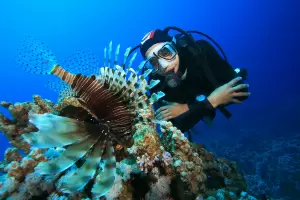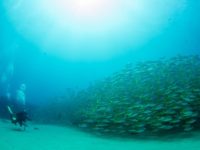
Do you love spending time on the ocean? Are you interested in dolphins and whales? While many marine biologists study these intelligent and endearing creatures, there are several areas of study within the field. Marine biologists may study anything from the largest whale down to tiny plankton, microbes, and even the seawater itself. The sea and its denizens are facing the challenges of coexisting with commercial shipping, recreational boating, plastics, chemicals, and other issues associated with human activities. Marine biologists study how these activities affect marine life, and suggest alternatives to minimize or prevent them.
What Is a Marine Biologist?
Marine biologists study life in the oceans, and sometimes the oceans themselves. They may investigate the behavior and physiological processes of marine species, or the diseases and environmental conditions that affect them. They may also assess the impacts of human activities on marine life. Many marine biologists work under job titles such as wildlife biologist, fish and wildlife biologist, fisheries biologist, aquatic biologist, zoologist, conservation biologist, and biological technician.
What Does a Marine Biologist Do?
Marine biologists study marine organisms in their natural habitats. They may investigate a population's behaviors or physiology. Or, they may assess the condition of habitats, and the effects of human activity on those animals and habitats.
Their research typically involves conducting species inventories, testing and monitoring sea creatures exposed to pollutants, collecting and testing ocean samples, preserving specimens and samples of unknown species and diseases, and mapping the distribution, ranges, or movements of marine populations.
In some cases, they may recommend alternative industrial practices to minimize negative effects on marine species and habitats. They may also communicate their findings and recommendations by writing reports and scientific journal articles.
Some marine biologists specialize in marine biotechnology. In other words, they investigate the adaptations and advantages of marine species and how they might be applied to industrial processes. For instance, one biotech company has mimicked the structure of shark skin to create doorknobs that germs and viruses such as MRSA can't attach to. This is a promising and interesting area of the field.
Where Does a Marine Biologist Work?
The majority of marine biologists work for state and federal government agencies. These positions typically offer greater job security and more opportunity for advancement. Many work at private research laboratories or consulting firms. Others work for aquariums, zoos, and museums, or become faculty members in academia. Some become high school science teachers.
Marine biologists may spend a significant amount of time outdoors when conducting research. Fieldwork often involves working on ships to locate, tag, and monitor marine animals and their movements, and to collect seawater samples.
What Is the Average Marine Biologist Salary?
While the U.S. Bureau of Labor Statistics (BLS) doesn't collect data on marine biologists specifically, they are included with zoologists and wildlife biologists. As of 2020, the median salary for marine biologists was $66,350. Those employed by the federal government earned more than those in state government and other sectors.*
Marine Biology Jobs & Job Description
While marine biologist careers vary significantly, at its basic level, this type of scientist specializes in the living organisms in bodies of water. Most marine biologists have an area of specialty - some study mammals, or fish, single celled organisms like plankton, or plants and coral. While duties do vary from job to job, but the list below includes job duties that one typically encounters as a marine biologist:
- Review research and literature relating to current discoveries in the field
- Collect field and control samples of biological samples and non-living media in order to perform analyses
- Research the behaviour and relationships among organisms in the marine environment
- Analyze the evolution and distribution of organisms and their environment in the ocean
- Use and maintain instrumentation used to track organisms and measure the properties of the environment
- Analyze the diversity and health of various components of the marine environment
- Consult and work to rebuild damaged marine ecosystems
- Use computer modelling to build predictive data for the marine ecosystem
- Consult with stakeholders regarding programs to monitor pollution
- Advocate for and monitor environmental compliance
- Provide assistance to fisheries management and coast guard units as required
Senior Marine Biologists often have a more broad set of job responsibilities that focus on management and leadership tasks. These responsibilities often include:
- Navigate various agencies and regulations in order to effectively monitor the ecosystem in question
- Construct grant proposals to fund research and fieldwork
- Draft scientific papers reporting research findings
- Facilitate a positive and challenging team environment with clear communication and mentoring opportunities
- Present research findings at conferences, and to policymakers and stakeholders
- Communicate with the public to help educate about issues affecting marine ecosystems like climate change and overfishing.
- Determine jurisdictions for various laws and regulations
- Develop scope of work for projects as well as calculate project budgets and schedules Writes environmental assessments and impact statements
- Shares data with consideration to endangered species advocacy organizations
What Is the Job Demand for Marine Biologists?
Jobs in this field are limited and competition is strong. BLS projects that job demand for zoologists and wildlife biologists will grow by 5 percent between 2020 and 2030.* Those with advanced math and computer skills will be at an advantage in the job market.
What are Marine Biologist education requirements?
A bachelor's or master's degree is typically required for entry-level marine biology research jobs, such as those at private research organizations and biotechnology companies. Doctoral degrees are usually required for faculty positions and other jobs that allow you to follow your own research interests.
While several schools offer programs in marine biology, many students graduate with bachelor's degrees in biology, zoology, fisheries, ecology, or other animal sciences. Classes in chemistry, physics, mathematics, and statistics are also important. Classes on public policy, English and writing are also helpful for working on regulatory issues and communicating with others.
Other Degrees Related to Marine Biology
What Kind of Societies and Professional Organizations Do Marine Biologists Have?
- The Association of Zoos & Aquariums (https://www.aza.org/) is a network of more than 6,000 zoo and aquarium professionals and organizations. It offers animal management information, business benchmarking data, conference proceedings, grants and more.
- With over 9,000 members, the American Fisheries Society (http://fisheries.org/) is the oldest and largest professional society for fisheries scientists in the world. The Society promotes professional development, networking, and information exchange among its members. It does this through a major annual meeting and several more specialized symposia. It also promotes student involvement, professional standards, and professional certification.
- The Society for Marine Mammology (http://www.marinemammalscience.org/) advances marine mammal science through meetings, publications, and the development of ethical standards for the treatment of marine mammals. The Society organizes workshops, training opportunities, and student chapters. It also maintains a job board, as well as a taxonomic list of marine mammal species and subspecies.
Other Recommend Resources
- MarineBio Conservation Society
- Marine Biological Association of the United Kingdom
- Marine Conservation Institute
*2020 US Bureau of Labor Statistics salary figures and job growth projections for zoologists and wildlife biologists reflect national data not school-specific information. Conditions in your area may vary. Data accessed September 2021.





